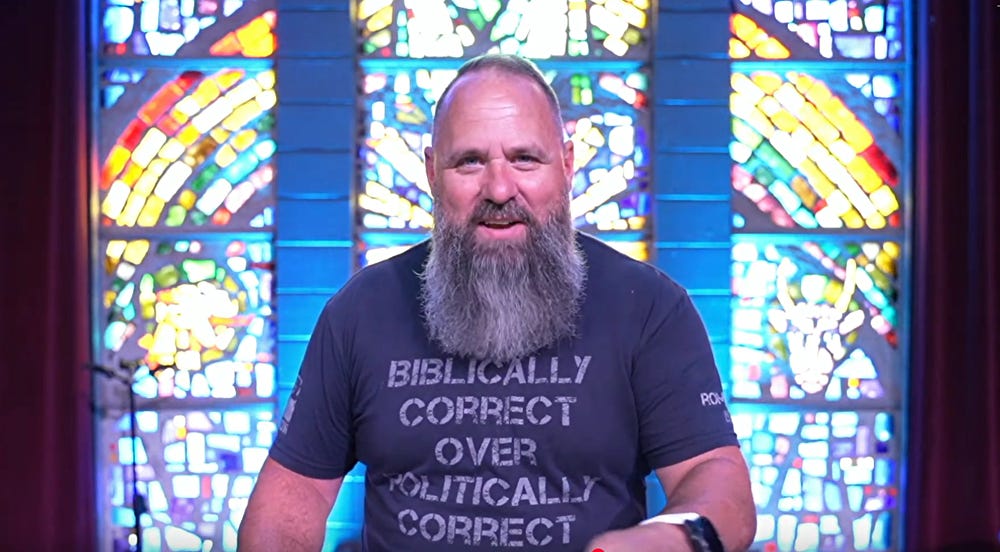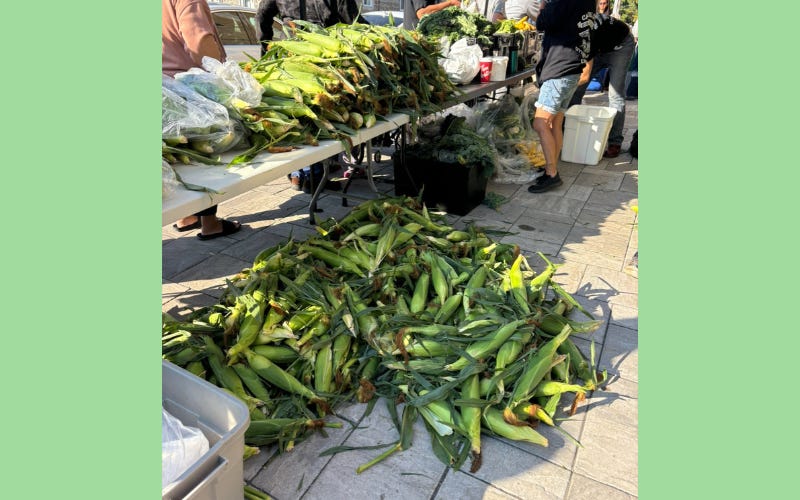If We Go to Jail, Call Grandpa
Pastors were being persecuted across the nation. Pastor Rob: 'We're gonna open the church for the truckers.'
Part 1: There Was Room at the Inn
When parishioners rang the doorbell at Bikers’ Church during the dark days of COVID, there was room at the inn. "If you need to come, there's room for one more," Pastor Rob McKee kept saying. "And before you know it, we had thirty people, then fifty people," wife Melissa recalls. "And then people from other churches" started to hear that face masks were optional, a choice.
One of their own parishioners is a military veteran who suffers from post-traumatic stress disorder (PTSD). Melissa describes him as "suicidal all the time" and unable to tolerate a mask on his face. "I wasn't gonna be the one to say, 'If you want to come to church, you need to put on a mask.' I wasn't gonna be that person. So we let him come to church without a mask, and didn't feel bad about it. At all. Because he chose to live that day."
People everywhere were in distress. "My boss in the federal government asked me to pastor my team through COVID," she says. "He called me and said, 'I know you do that in your other life.'" Aware that folks were struggling, he told Melissa, "I need you to get them across the finish line."
For about a year, that's what she did. She'd phone people. She'd set up meetings. One person lived in a postage-stamp-sized basement apartment, with no family in the city, and a parent suffering from cancer. Another, seriously into fitness, wondered: How long would it take for anyone to notice if she were to faint and hit her head while working out alone at home?
"The park benches were cordoned off," says Melissa, "there was no place to go." In some cases, she fetched people in her own car, bringing them to her own residence for the day. "I planned Zoom trivia games, different team events," she remembers, "Just trying to be creative and caring for people's hearts."
When her two-year contract came up for renewal, her boss was apologetic. "I don't know when we're going to be travelling again. I can't justify keeping you in this position, and I don't have anything else for you." She told him she totally understood.

Back at the church, a family-run farm on the outskirts of the city became cherished patrons. From June to November, the farm supplies the nation's capital with fresh produce, while operating several roadside stands that close on Sundays. Whatever remains unsold by end-of-day Saturday is collected by Dave, a Bikers' Church parishioner.
Melissa says Dave "goes every single week with his own truck and trailer, and he picks up all of that produce and he brings it here. I have a whole team of volunteers that absolutely love, love, love to work the vegetable stand." Everything is free. "People make donations cuz they're grateful. But it's all free. It's been two, three years that we've been getting this produce."
As their congregation continued to grow, Melissa remembers visitors from elsewhere, a well functioning family unit. "They had a healthy marriage, enough money, they live in a beautiful home. Their kids played soccer." But their six-year-old was in trouble, "Their doctor was trying to diagnose her with clinical depression." During their visit, that child "was able to see other kids with no masks on. She was able to hug. The kids played together over there, in the corner," Melissa remembers. The six-year-old "flipped that day, and she's been joyful ever since. It wasn't depression, it was deprivation."
She also remembers a young woman,
This is quite late into it, too. She fell to her knees on the front carpet, and she started to weep. And I went over. I'm like, 'Are you OK?'
She's like, 'I have not been anywhere but my house and the grocery store since this all started fourteen months ago. I haven't hugged anybody.' And so I just wrapped my arms around her, and she wept in my arms. Gives me tears just thinking about it.
Other churches "were sending us messages, cheering us on. We're so proud of you guys. One hundred percent, you've got our support." Part of her wondered why they were speaking so softly. "If you'd be public, too, it would be better for all of us," she remembers thinking. Why was bravery in such short supply? "And then," she says,
there were churches who were saying from the pulpit, 'You need to get vaccinated. You need to wear a mask. Because you need to show how much you love your neighbour.' While I'm holding a prostitute out back who's just been beaten by her pimp. That's got one shoe on and dirty clothes, and blood all over her face.
And I want to say, 'You think I'm not loving my neighbour?'
Although good things were happening, relations with their direct neighbours were souring. "There's houses all the way around our building," Melissa points out. "So anybody can look out their front window and see what we're doing."
Bylaw officers showed up several times. But the required arrows were dutifully directing traffic on the floor, and there was an ample supply of hand sanitizer. "We took every other chair away," says Melissa. "We didn't have tablecloths. We used paper cups" rather than mugs. "We stopped our food giving, making meals. We just stopped all of that." From her perspective, they'd sincerely tried to do their part.
In her words, bylaw repeatedly concluded, "Well you're doing everything you have to be doing. If people aren't wearing masks, that's on them. It's not on you guys." But troubled waters aren't easily soothed. Prior to COVID, "we were part of the Vanier Neighbours Facebook group," says Melissa. "You know, we would do neighbourly things, and they were so supportive. They absolutely loved us. And now they can't stand us. They hate us. They kicked us out of the group."
Her "justice meter" - which she describes as high on a good day - "started to just go off the charts." On Facebook, she says, she became
really vocal. You couldn't convince me that the way the government was asking people to live was OK. Some people unfriended and unfollowed me. Sadly, some of my very closest friends are no longer my friends. But I couldn't keep quiet. Cuz, I realized, you're trading your safety for freedom. And you're gonna end up with neither.
We could see the evil, and we weren't going to go along just to get along. I mean, we told our kids, 'If we go to jail, you call grandpa, he knows what to do.' We talked to my father-in-law, told him this is a very real possibility. We were watching Pastor Artur Pawlowski [in Calgary] being dragged out of his vehicle. There were different pastors, across the nation, who were being persecuted for keeping their churches open.
Rob even preached from the pulpit. He said, 'You know, this could cost us as a church, it could cost us.' He prepared people for what might come - because of the risk we were taking, the stand we were making. We have tax exemption benefits, we don't pay property tax. We do provide, however, $2.1 million dollars in services and programs every year. That's the number.
Melissa says she's personally "been refused medical care three times because I wouldn't put a mask on. I've been contacted by the police for my Twitter posts and my Facebook posts." In early 2022, she was watching Freedom Convoy trucks from western Canada roll toward Ottawa. When Rob told her, "We can't do anything. It's too political and we're already under so much scrutiny," she struggled to hold her tongue. "I immediately hear the Lord say, 'Be quiet. Leave him with me.'"
She continues,
I'm pretty fiery. I have opinions that are very strong. So, through gritted teeth, I was like, 'OK, God. But you gotta work on him, you know.'
And the next morning, Rob brought me a coffee really early. It was still dark out, and I said, 'What time did you get up?' He said, 'I've been up since three. I'm wrestling with God.'
And he just stood in front of me and said, 'We're gonna open the church for the truckers. We're gonna be a warming station. We're gonna be open from ten to ten every day. We're gonna feed them, we're gonna clothe them. We're gonna do all the same things for them that we do for the community.'
And that just shot me out of bed. I was like, 'OK, I need volunteers. I need food. I gotta get a schedule together.' That was it. I was off and running.
next installment: The Polish Army







Wonderful and courageous story.. Kudos to Pastor Bob and Melissa!
There are few with tenacity. It's is refreshing to know they exist. Some like Pastor Bob and Melissa and Artur Pawlowski are those with integrity and tenacity.